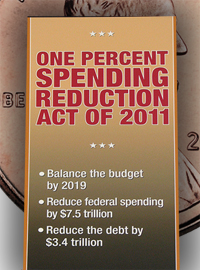| Connie Mack: Trying to Balance the Budget a Few (Trillion) Pennies at a Time |
 |
|
By Ashton Ellis
Thursday, August 04 2011 |
What if a bill could provide a fail-safe way to reduce federal spending by one percent a year, cap spending at a historically sustainable level and balance the budget in eight years? If it sounds too good to be true, it isn’t. But it does need a grassroots movement to demand a vote on it in the House and Senate. Rep. Connie Mack (R-FL) filed his “Penny Plan” last spring, and it is a model of simplicity and transparency. It freezes federal spending at 2011 budget levels, requires an overall spending cut of one percent (one penny per dollar) every year for six years and caps future spending at eighteen percent of GDP – the historical average between WWII and 2010. The reductions add up to a balanced budget in eight years, with a savings of $7.5 trillion. But what if politicians fail to agree on what to cut? In that case, Mack’s Penny Plan mandates an automatic, across-the-board one percent spending reduction. At worst, every department takes only a one percent annual haircut. At best, federal lawmakers would have an annual incentive to make targeted cuts in spending that actually make government perform better. Faced with the reality of annual spending cuts, members of Congress would have an incentive to move beyond ephemeral platitudes about eliminating “waste, fraud and abuse,” not to mention budgetary trickery, and get down to the serious business of downsizing the government. The current $14.3 trillion deficit indicates Americans are crediting expenses they cannot afford. It’s time to start shutting down, streamlining and consolidating appendages of government that have outgrown their utility. State governments are no stranger to this. In Texas, the Sunset Advisory Commission reviews all state agencies on a rolling basis (usually every ten years). As required by law, the agency being reviewed will cease to exist unless it can convince the legislature that it still serves a viable purpose. Since the Sunset law went into effect in 1978, 58 agencies have been abolished, and another 12 have been consolidated. The key to the Sunset process is that every agency of state government is assumed to be temporary. When was the last time that assumption was built into a comprehensive “reform” bill rushed through the U.S. Congress? Like Texas’ Sunset law, Mack’s Penny Plan reverses the typical government assumption that bureaucracies will grow and spending will soar. Notably, Mack’s plan takes a different approach than House Budget Chairman Paul Ryan (R-WI). Ryan’s “Path to Prosperity” proposal remains the most detailed blueprint available for bending the federal spending curve down. Ryan’s reforms to Medicare and Medicaid offer cost savings to taxpayers and flexibility to beneficiaries. If the 2012 elections sweep a conservative GOP into the White House and congressional majorities, Ryan’s plan may very well become the framework for substantive entitlement reform. But before Washington, D.C. can be trusted to give Paul Ryan’s ideas serious consideration, its political leaders must first prove that they understand the difference between spending reduction and deficit reduction. The first presupposes a shrinking government. The latter leaves room for raising taxes. For those still angry that raising the debt ceiling seemed to be a foregone conclusion to leaders in both parties, Mack’s Penny Plan provides a quick reversal of fortune. Just imagine all the energy that went into concocting phantom cuts being redirected toward making smart (and real) cuts. Dubious defense contracts like the F-35 alternate engine: Gone. Wasteful “green” energy subsidies: Eliminated. If Congress really put its mind to it, maybe even no longer useful or affordable agencies would be dismantled. At a time when Americans are disputing not just the amount of spending, but the purposes of government, Connie Mack’s Penny Plan may be the answer to the question: How do we change the culture of Washington, D.C.? |
Related Articles : |
























